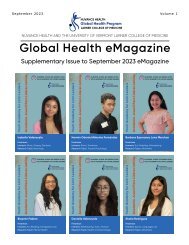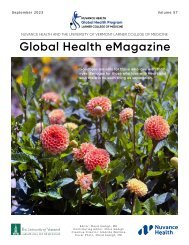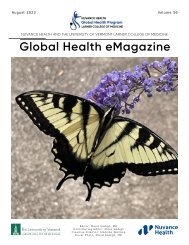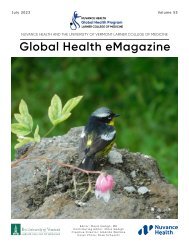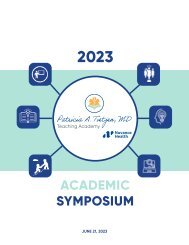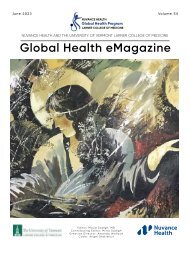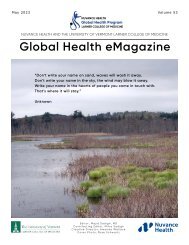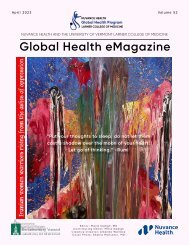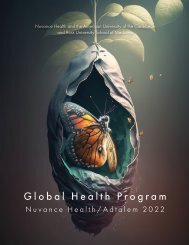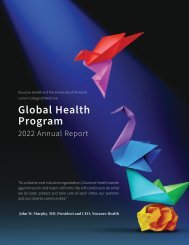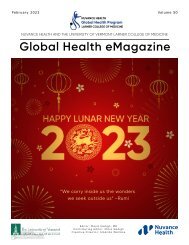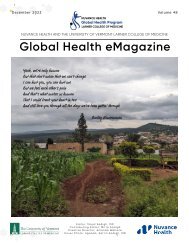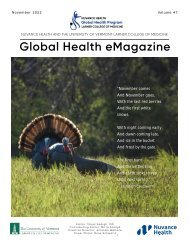eMagazine March 2023
Create successful ePaper yourself
Turn your PDF publications into a flip-book with our unique Google optimized e-Paper software.
OUR PEOPLE,<br />
OUR MISSION<br />
Global Health<br />
<strong>eMagazine</strong><br />
<strong>March</strong> <strong>2023</strong><br />
Highlights<br />
Reviews<br />
GH Narrative<br />
Reflections<br />
Hispanic and Latinx Voices<br />
Global Local<br />
Voices of Ugandan<br />
Students<br />
Nursing Division<br />
Women’s Health Education<br />
Innovation and Technology<br />
Our Beautiful Planet<br />
Art to Remind Us of Who We<br />
Can Be<br />
Article of the Month<br />
You’re Invited<br />
Photo News<br />
Calendar<br />
Global Health Family<br />
Resources<br />
Previous Issues of<br />
the <strong>eMagazine</strong><br />
Women’s Health Education<br />
Section Editor: Sarah Cordisco, RN<br />
Staff Nurse at the University of Vermont<br />
Impact of Poverty on Sexual Abuse of<br />
Pre-Teens<br />
Written by D. Parekh MD<br />
(Volunteer doctor at Adult Rape Clinic), Harare,<br />
Zimbabwe<br />
Dr. Darshani Parekh - Senior Resident Medical Officer at Parirenyatwa General<br />
Hospital in Zimbabwe. She is also a volunteer doctor at the Adult Rape Clinic<br />
for the past 4 years. She is the Treasurer of the Zimbabwe Women Doctors’<br />
Association since 2021 and has been the social media manager for the<br />
association since 2020.<br />
The awareness of sexual abuse in the world, especially in the rural communities,<br />
has increased. Sexual abuse awareness has definitely helped people in seeking<br />
adequate help and being aware of what is counted as sexual abuse. However,<br />
there is still a high incidence of late reporting in Zimbabwe.<br />
Poverty has been one of the greatest contributors to sexual abuse in the rural<br />
and urban areas of Zimbabwe. Poverty has a direct impact on the education<br />
level of most of the sexual abuse survivors.<br />
Most of the pre-teens who have presented to the hospital for sexual abuse have<br />
had little to no education for their age due to lack of funds. The lack of education<br />
has impacted the understanding of what sexual abuse is, as they will not be able<br />
to read or be in a school setup to be taught about sexual abuse. The parents of<br />
these children have also had minimal education as they were also brought up<br />
in similar circumstances and became parents at a young age. Thus, the parents<br />
do not teach their children about sexual abuse or signs of it as they were never<br />
taught to recognize it. The cultural taboo of not speaking about sex has also not<br />
been addressed in these communities yet and thus “the talk” is never done. This<br />
is a cycle in which most of the kids have been exposed to and thus are not fully<br />
aware of what sexual abuse is and that it is not right.<br />
In the impoverished background the children are mostly malnourished and thus<br />
are weak and easy targets for perpetrators. The poor background has made the<br />
children easy targets of abuse by the slightly well off members of the community.<br />
The children are usually easily bribed by the perpetrators with sweets or $1 to<br />
not tell anyone about the incidents. If the kids are not bribed, then they may be<br />
threatened to be killed if they tell anyone thus reporting late if they report at all.<br />
As stated above, poverty has a direct impact on the sexual abuse of teens.<br />
Poverty affects education level, nutrition status, and contributes to low selfworth.<br />
This is a cycle that can definitely be broken by providing more awareness<br />
in these sensitive areas, self-worth workshops, and family-building exercise for<br />
easier and faster communication.<br />
28




